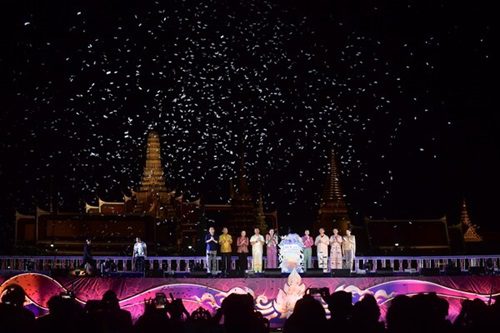 There’s something timeless about how water finds its course—carving paths through mountains, etching stories into stone, and in Thailand’s case, cascading across the streets of Bangkok to herald another Songkran. But this year, the tides run deeper.
There’s something timeless about how water finds its course—carving paths through mountains, etching stories into stone, and in Thailand’s case, cascading across the streets of Bangkok to herald another Songkran. But this year, the tides run deeper.
The Maha Songkran World Water Festival 2025 has arrived to drench revellers in joy and propel Thai culture toward global acclaim. As the sun dipped below the horizon last night, Sanam Luang—a ceremonial ground that has witnessed centuries of Thai history—roared to life with colour, drums, and symbolism.
Thailand has launched its bid for UNESCO cultural recognition, and it’s doing so in an old-fashioned way—through spectacle, substance, and sincerity.
Parade of a Nation
The grand parade—aptly described by one local as a “moving museum with rhythm”—flowed from Democracy Monument to Sanam Luang, delivering a visual thesis on Thai identity. Eight themed floats rolled through the city like chapters of a living manuscript: the serpent-like Naga weaving blessings through a river of silk, a float laden with tropical fruits in a riot of hues, and the unmistakable spice and steam of a Tom Yum Kung tribute—complete with oversized prawns.
Of course, no Thai cultural celebration would be complete without the gentle giant. The elephant float, adorned in golden cloth, was greeted with audible awe. Nearby, a fanciful depiction of the Siamese fighting fish darted past in sculptural form, flashing iridescence and national pride.
This is not merely artistry on wheels. It is national storytelling, finely carved and rolling with purpose. Today’s second parade will offer a final flourish, with all floats remaining on display at Sanam Luang until 15 April.
Festival of Five Senses
Each afternoon, as the Bangkok heat softens, Sanam Luang is transformed into a village of senses. Music floats on the breeze. The scent of grilled satay and herbal incense mingles with laughter. From 3 pm to 11 pm, the grounds become a sanctuary for tradition: puppetry from the southern provinces, Nora dancing performed with aching grace, and classical troupes fill the main stage alongside contemporary artists.
The nightly drone shows—more poetic than pyrotechnic—bring the skies alive in a modern nod to ancient rituals.
Meanwhile, the Regional Identity Zone lays out the Thai map in miniature, offering architecture, crafts and customs from the north, south, east, west, and central plains. It’s less of a showcase and more of an invitation—to sit, listen, taste, and be still with Thailand’s enduring spirit.
A New Year with New Intent
It would be a mistake to consider this festival mere fanfare. At its heart lies Songkran—the Thai New Year—rooted in family, respect, and spiritual renewal. Visitors will witness age-old practices still tenderly observed: elders being gently poured over with scented water, merit-making at temples, and the humble exchange of blessings between generations.
For Thailand’s Tourism Authority, this year’s Songkran is a springboard. A dedicated festival app guides travellers with real-time updates, maps and cultural listings. Complimentary shuttle services from Central Pinklao and MRT Sanam Chai ensure that no celebration remains out of reach.
Even the country’s environmental conscience has found its place. Through the GCYOU-TURN initiative, festival-goers are encouraged to walk lightly. Recycling stations, water conservation tips, and biodegradable containers subtly remind guests that heritage must be preserved, not just paraded.
Tourism’s Tidal Wave
The economic ripple from Songkran is anything but minor. The Tourism Authority of Thailand (TAT) forecasts that from 12 to 16 April, the country will generate over 26.5 billion Baht in tourism revenue.
More than 476,000 international arrivals are anticipated, contributing upwards of 7.3 billion Baht, while domestic movements are projected to top 4.4 million, delivering over 19 billion Baht to local economies.
This isn’t just a festive windfall. It’s strategic soft power—Thai style.
A Cultural Bid Carried by Water
The real ambition, however, is not written in ledgers but in letters: UNESCO. For years, Thailand has sought recognition of Songkran as an Intangible Cultural Heritage of Humanity.
Now, the timing feels right with the world’s eyes on Bangkok and the nation’s spirit in full bloom.
As Prime Minister Paetongtarn Shinawatra noted during the opening ceremony, “The Maha Songkran World Water Festival 2025 brings together soft power, technology and creativity to deliver a memorable experience that boosts tourism, drives the economy and showcases Thailand’s ability to host world-class events.”
It’s a statement as measured as it is ambitious. And if Bangkok’s opening night is any indication, Thailand is prepared to prove it.
By Kanda Limw




















